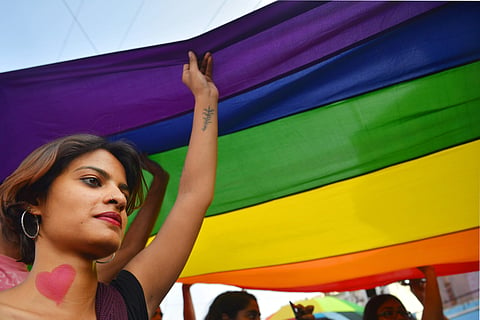

HYDERABAD : In the last few years, conversations around various gender identities and sexual orientations, and their inclusion, have improved a lot. But the work is far from done. While the queer community continues its fight against society’s discrimination daily, there’s little awareness about the prejudice within the community. “The biggest fight a pansexual or bisexual person fights is with the LGBTQIA+ community, than compared to the rest of the society,” says Hyderabad-based expressionist dancer, folk singer, drag artiste Patruni Chidananda Sastry, who tells us about his account of being discriminated against being pansexual.
Pansexuality is a term to describe the sexual, romantic, or emotional attraction towards people, regardless of their sex or gender identity. Under it, there are an array of sexualities that fall in the Multisexual Spectrum (Mspec) such as bi-curious, homo-romantic, pomosexual, auto sexual, polyomous, omnisexual, and androsexual, among others.
Patruni was born as a man and identifies as a pansexual nonbinary person. One fine morning, Patruni woke up to loads of messages and mentions on Instagram, that triggered their anxiety around gender. “These messages were from a drag performer of another country. They disqualified my identity as a queer person, assumed me to be homosexual and accused me of hiding my gayness by choosing a partner of an opposite gender. This was the 100th time someone questioned my sexual identity and brushed aside my entire existence of being a pansexual. It was heart-wrenching,” says Patruni.
For long, pansexuals have been treated as minorities and face mockery and stigma due to their orientation within the LGBTQIA+ community, they say. “People assume that drag performers are always gay. They assume if a man is un-apologetic for his femininity, he would be a monosexual homosexual. People assume that my pansexuality is invalid or a phase or me being not serious,” they say.
Upon introspecting, Patruni realised that pansexuality is hardly understood. They found that pan/bisexuals were always regarded as outcast, as compared to people who identify as gay, trans or lesbian. Pansexual people face discrimination from both heterosexual spaces as well as the queer spaces.
Apooh Mahi, a Hyderabad-based dancer and social media influencer, who identify as a bi-women, says “When I came out as bisexual, there were a lot of questions. Some people thought I am doing It because I am an influencer, but they hardly knew that humans don’t have a control on our hormones and sexuality. Hence, it is as natural as heteronomy”.
“The pan/bisexual erasure has been experienced by 9 out of 10 pan/bisexual individuals and most of the times, the erasure comes from people within the spectrum,” says Patruni. Xen Aerat, a Hyderabad-based gender variance artiste and performer, believes that everything boils down to ignorance. The lack of knowledge creates fear and subsequently defense, anger and hatred.
“The world is only now being subjected to the awareness of the multiplicity of sexual/gender identities and there is immense pressure to throw millennial-long conditioning. There is much power in bringing awareness where there is a lack. And in most cases, a lack of awareness is usually accompanied by ridicule, defence, lack of acceptance, refutation, anger, rejection, hatred ,” they say.
“I believe the society is picking up conversations of LGBTQIA+ acceptance and inclusion. This is a high time to push a little love toward the multisexuality spectrum community too as though their lives seem to be all rosy, there are immeasurable thorns pinning up towards there acceptance. Pansexual/bisexual people are as valid as any other human and we need to be introspective of their preferences, choices and visibility,” says Patruni.